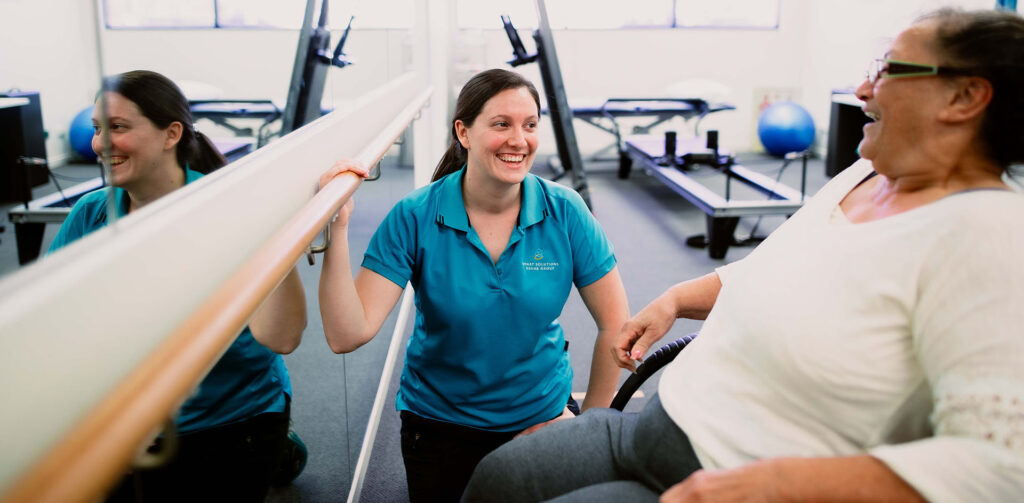Posts Tagged ‘Physiotherapy’
5 Myths about Exercise Physiologists
Accredited Exercise Physiologists (AEP’s) are university-qualified allied health professionals who design, deliver and evaluate safe and effective physical interventions for people with acute, sub-acute or chronic medical conditions, injuries or disabilities. AEP’s work across a vast spectrum of conditions in both public and private sectors, including neurological and disability sectors. AEPs can help people living…
Read MoreThe importance of maintaining physiotherapy services during COVID-19
Physiotherapy has long played an important role in maximising independence and optimising mobility. At the beginning of the pandemic, leading physiotherapists expressed concern that stay-at-home orders would lead to a significant decrease in physical activity and that this might result in higher instances of falls and decreased physical function in older Australians. These concerns reflect…
Read MoreBack to Basics: Physiotherapy
What is a Physiotherapist? Physiotherapists possess in-depth understanding of the human body in terms of both structure and movement. This comprehensive knowledge allows Physios to assist with a diverse range of health conditions, from sporting injuries through to more serious health conditions. What can a Physiotherapist help with? Physios diagnose and treat a variety of…
Read MoreAssistive Technology, Independence and Inclusion
What is Assistive Technology? Assistive Technology (AT) can constitute an integral part of the support framework that helps people living with a disability realise their potential. AT generally incorporates any equipment, system or design that assists a person with a disability to navigate their home, workplace, school, or community, and to undertake tasks and achieve…
Read MoreSpotlight on Spine Injuries
The Role of Physiotherapy in Retaining Independence After SCI Last week (7th to 13th September) was Spinal Cord Injury Awareness Week, with this year’s focus highlighting the importance of accessibility in ensuring opportunities for people with a spinal cord injury. The spinal cord is a complex bundle of nerves responsible for sending brain signals to…
Read More5 keeping active health tips
5 tips to keep active for good health QUESTION: What’s the common denominator amongst these typical activities that occur during most people’s day to day life? Watching an episode on Netflix. Writing an email to a friend or colleague. Reading a book. ANSWER: All of these activities are considered to be ‘sedentary’ behaviours! Sedentary behaviour…
Read MoreAbout Allied Health
What do Allied Health Professionals Do? Allied Health Professionals generally include the following disciplines: Occupational Therapy Physiotherapy Speech Pathology Dietetics Social Work Podiatry Allied Health Professionals study at University between 3-4 years to achieve an undergraduate degree. Do Allied Health Professionals need to keep learning after university? Yes, absolutely! Allied Health Professionals are required to…
Read MoreAmputation
Amputation Awareness and Treatment Did you know: Someone will undergo an amputation every 30 minutes in Australia. Losing a limb is a life changing event and many Australian’s are dealing with the associated challenges every day. National Amputee Awareness Week is recognised during 4-11th of October. This week is about raising awareness, making sure people…
Read MoreFragile X Syndrome
Inherited Conditions with Fragile X Gene Fragile X-associated Disorders are a term given to a range of inherited conditions that occur as a result of alterations in the FMR1 gene (Fragile X gene). It is estimated in Australia, 1 child per week is born fully affected by Fragile X syndrome and 20 are born carriers…
Read MoreSpine injuries
Spinal cord injury A spinal cord injury (SCI) is caused from damage to the spinal cord which results in a loss of movement and sensation below the level of the injury. Spinal cord injury can occur when the spinal cord is severed, compressed or bruised which disrupts blood and oxygen supply. SCI can be traumatic…
Read More








